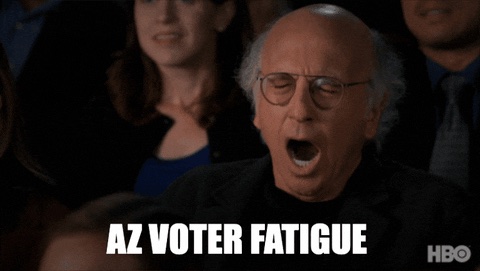Maricopa County voters should be prepared for unprecedented ballot length in the 2024 November election. Voters haven’t encountered a ballot of this magnitude in nearly two decades. Lawmakers have inundated the already jam-packed ballot with a flurry of potential measures creating serious logistical hurdles and raises concerns about voter fatigue. Moreover, the unknown number of ballot referrals and citizen initiatives that could make the ballot further complicates the situation.
These challenges underscore the need for efficient and accessible electoral processes to ensure that voters can effectively participate in democracy.
It’s been 18 years since Maricopa County voters faced a ballot that was more than one piece of paper (referred to as a “card” in elections jargon.) That 2006 election had two cards.
Already for the 2024 ballot, the County is at two cards, or four sides, for voters to fully complete their ballot. That could all change by November.
At just over halfway through the 2024 Legislative Session, Maricopa County voters are faced with the possibility of the ballot growing to three cards. This third card may be needed because of the potential for more Legislative ballot referrals and citizen driven ballot initiatives that may qualify for the ballot. This means that voters will potentially have six sides to complete to fully vote their entire ballot.
Already, the 2024 ballot contains the Presidential election along with other federal, state, county, municipal and other governmental entity elections such as school districts. It also has judicial retentions on the ballot – 48 judicial retention questions in Maricopa County alone.
The current unknown is how many ballot referrals and citizens initiatives will qualify for the 2024 ballot.
In 2023, lawmakers already referred five ballot measures to the voters in Maricopa County for the 2024 ballot. Four are statewide: Emergency Declarations Amendment, Financial Benefit Upon Death of a First Responder, Require Partisan Primaries Amendment, and Signature Distribution Requirement for Initiatives Amendment. And one is for Maricopa County only voters: Maricopa County Prop 479 (transportation sales tax extension).
Several other SCR’s and HCR’s are still currently moving through the process including:
- HCR2003: for-sale housing; development; groundwater replenishment which was passed out of the Senate Natural Resources, Energy and Water committee on March 21st
- HCR2038: drug cartels; terrorist organizations which passed out of the Senate Military Affairs, Public Safety and Border Security on March 13th
- HCR2040: public monies; prohibited expenditures which passed out of the Senate Judiciary committee on March 13th
- HCR2050: energy source; restriction; prohibition which passed out of the Senate Natural Resources, Energy, and Water committee on March 21st
- HCR2052: rulemaking; legislative authority which passed out of the Senate Government committee on March 13th
- HCR2056: preferential treatment; discrimination; prohibition which passed out of the Senate Government committee on March 13th
- HCR2058: legislative districts; population; census; citizenship which is scheduled to be heard in the Senate Appropriations committee on March 26th
- HCR2060: lawful presence; e-verify program; penalties though this has been transmitted to the Senate, it did not receive a hearing in the House
- SCR1012: rulemaking; legislative ratification; regulatory costs passed out of the House Regulatory Affairs committee on March 13th
- SCR1020: general appropriation bill; continuing appropriation passed out of the House Appropriations committee on March 13th
- SCR1023: general election day; all offices passed out of the House Municipal Oversight & Elections committee on March 13th
- SCR1036: cities; towns; elections passed out of the House Municipal Oversight & Elections committee on March 20th
- SCR1041: ballot measures; challenges passed out of the House Municipal Oversight & Elections committee on March 20th
- SCR1044: judicial retention elections passed out of the House Municipal Oversight & Elections committee on March 20th
After Governor Hobbs vetoed a record 143 bills in 2023, the Republican majority in the State Legislature introduced more than 70 potential ballot referrals as a work-around to having the Governor decide the fate of proposed legislation. Under the Arizona Constitution, legislative ballot referrals do not need the Governor’s approval. They only need a majority vote of both the House and Senate to be sent directly to the voters. If voters then approve, these ballot referrals then become law and would be considered “voter protected,” making it very difficult to address any changes that may be needed in the future.
So far in the 2024 Legislative Session, lawmakers have referred two ballot measures, Property Tax; Refund; Nuisance Enforcement and SCR1021: sex trafficking; child; natural life. So on the legislative referral front, with the five that are already on the ballot from 2023, the two that have already been approved in 2024, and the possibility of another 14 that are still in play, Maricopa County voters could potentially face 21 legislative ballot referrals in November!
And this number does not include the 13 citizen initiatives that are currently in the process of gathering signatures to qualify for the General Election ballot.
Lengthy ballots produce several challenges including longer lines at polling locations, increased cost of printing and mailing multi-card ballots, and voters suffering from ballot fatigue to name just a few.
According to the Arizona Association of Counties, the 2022 General Election ballot contained 10 ballot propositions and 85 total contests. Voters in 2022 took an average of 9 ½ minutes to complete their ballots at the polls. Some took as long as 30 minutes to completely vote their ballots.
Having long, multi-card ballots risks voters not voting their full ballot or forgetting to mail back all the cards that make up their entire ballot. A potential three card ballot will also increase the time for ballot tabulation and the time to accomplish any statutorily required recounts.
